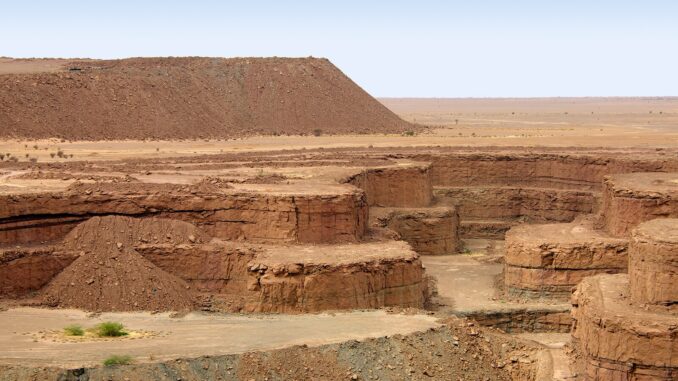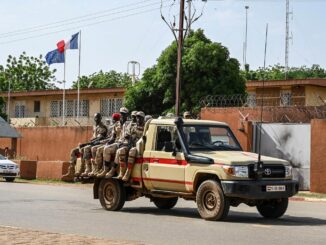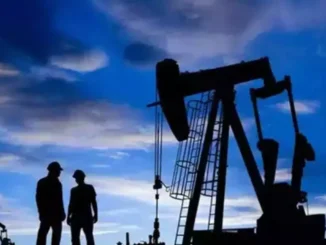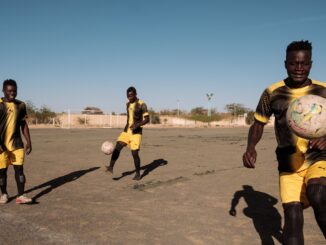
French nuclear fuel cycle giant Orano has been unable to ship mining necessities in or uranium out of its Somair mine in Niger since a Jul. 26 military coup in the country. On Sep. 6 Xavier Saint Martin Tillet, the head of Orano’s mining business unit, sat down with Energy Intelligence’s Grace Symes on the sidelines of the World Nuclear Symposium in London to discuss Orano’s outlook on Niger and future prospective mines across the globe. A shortened and edited version of that conversation is below.
Q: I want to start by asking you about recent news: Cameco’s announcement this week that there will be a 2.7 million pound production shortfall this year from its Canadian uranium operations in which Orano has a stake. Does that shortage impact Orano’s production figures?
A: It does. It’s a joint venture, so the share we get is proportional to the production they make.
Q: Will Orano meet its sales commitments this year, given the issues in Niger, and then this Canadian reduction in production?
A: Yes, we have a very good view on that. Orano has never failed its customers. We have the possibility to meet all our commitments. There is no issue from that aspect.
Q: What are Orano’s inventory levels like?
A: We have several months of production as inventories. From what we have seen it will be sufficient to meet all our commitments despite some production imbalances.
Q: Which projects are Orano’s top priorities for developing future mines?
A: Orano has exploration projects in Canada and in Central Asia, and this [exploration] we have been doing and we will keep doing to prepare our future. In 2022-23 exploration campaigns in Canada, we have had some really good intersects with interesting prospects.
In Central Asia — Kazakhstan, Mongolia and Uzbekistan — we are focusing on the projects that can be exploited using ISR [in situ recover] technology, which is most promising from economic and environmental standpoints. We are also in the process of industrial development of the South Tortkuduk site in Kazakhstan to increase our current production.
We believe that long-term partnerships are key for successful project development. With this perspective, we are continuing our projects in Niger. Our commitment to the Imouraren project remains strong.
Q: When is the next shipment of uranium going out of Niger scheduled for?
A: Actually, only a few transports (4 to 6 shipments) are organized each year. There has been one in August, actually, the material was sent out of Niger in July [before the Jul. 26 coup] and it was shipped out of Benin in August.
Q: Are you looking at shipping through alternate routes such as potentially Algeria?
A: We have assessed other options, but for the time being we don’t have a problem with shipping out material, we have a problem with receiving material to operate our plants, our mine. Once this is resolved, sending out production will need to be tackled. Our belief is that both issues will be resolved simultaneously. Our focus now is to start operating again without delay once the situation is resolved.
Q: These shipments that Orano is not able to import, are they just the daily items you need to mine?
A: To operate we need sulfur, we need soda. We need many things. We have some inventory but not so much. Currently, the border is closed so none of this is coming. The mine is still operating but the plant has been stopped. The mine will keep operating under the current situation for a few weeks. But our decision was to advance the maintenance scheduled for early next year, and do it now to be ready to operate at full capacity — and under good operating conditions — once it is resolved. It’s not a problem with our operations. It’s a global issue, and we are affected by that.
We believe that there will be a solution one way or the other. Our role is to prepare the future in that respect. And we are confident that it will go back to the normal situation. One big asset of Orano is the teams of Orano in Niger. We have been operating in Niger for the last 50 years, developing strong, competent local teams that are mobilized to keep the plant in a ready-to-restart condition. We will be perfectly ready once this is resolved.
Q: There have been reports that the French government is considering partially withdrawing troops from Niger. Are their troops on-site at Orano’s operations there?
A: No. The security at Orano’s sites is done by the Nigerien Defense and Security Forces. They have done it in the past. They are doing it in the present. There is no indication they will not do it in the future.
Q: Orano has been operating in Niger through a few coups and through 50 years. But Global Atomic CEO Stephen Roman told Energy Intelligence there seems to be “a general feeling across West Africa that it’s time for the French to go home.” Are you seeing this sentiment? And if so, do you think it will impact Orano uniquely as compared to other juniors in the country?
A: The current situation is that we are indicating our will to operate. We have had some interactions with the authorities and we have no indication of such issues as mentioned. In Niger, we have three activities. We have mine remediation at Cominak and as a responsible miner, we are committed to doing the work till its completion. We have the mine in operation, and we are still operating it with Somair. This mine recently had its life extended for 15 years, thanks to exploration work and investment in innovation. And we have a project, Imouraren, for which we signed an agreement in May, and we will keep working on this project. In all those entities we are associated with the state of Niger via our JVs. We believe those are JVs for the benefit of both shareholders. We believe that we still have a future in Niger, and the feedback we have received is rather positive.
Q: Would Orano still bring Imouraren into production under the current government?
A: We will keep working on this project. It’s a long-term project. Our target is to build a feasible project from the technical, environmental and social standpoints for the benefit of both shareholders — Orano and the state of Niger.
Q: Do you believe that the coup will have a long-term impact on the uranium market?
A: The impact of Niger on the uranium market is rather limited. It’s 4% of the total volumes. This is roughly the same quantity as the production increase that we’re implementing currently in Kazakhstan. We need to put all this in perspective. But our view is that things are not going to stay as they are forever. We believe we will restart production in Niger. It’s not exactly clear when, but we believe it’s not a very long issue. You asked if we are organized to sell to our customers. This year, we are organized to sell to our customers, and we don’t believe that it [the situation in Niger] is going to last forever as well.
Q: Orano has projects in Uzbekistan and Mongolia too. Do you think Orano has an advantage over previous uranium companies that have tried to develop projects in these countries and have been unsuccessful?
A: First, Orano has been working in Mongolia for a very long time. We believe in building long-term partnerships with host countries. During its 25 years of operations in Mongolia via local subsidiaries, Orano has proved to be a trustworthy partner to Mongolia: $260 million invested, a responsible approach in terms of social development, environmental health and safety demonstrated, and a commitment to ongoing dialogue and transparency. Our project will serve as a reference for the development of the industry in Mongolia. Currently, we are working with the government and defining what will be the project. I think we have been very serious and very committed to this project.
In the project in Uzbekistan, we are currently the only foreign uranium mining company present. Our JV established in 2019 is developing rapidly with a new pilot [plant] and extensive exploration drilling. In November 2022, Orano, GosComGeology and Navoiyuran signed a strategic cooperation agreement that lays the foundations of an exclusive alliance for the development of new uranium mines in Uzbekistan, beyond the Djengeldi project currently led by Nurlikum Mining. This is a significant broadening of the scope of the collaboration, reflecting the trust established between Orano and its partners in Uzbekistan.
Those are serious options for Orano.
Q: How would you compare these projects in Mongolia in Uzbekistan to Imouraren in Niger or potentially Trekoppje in Namibia in terms of which might be the top priority to get into production?
A: We see the uranium market going up in the next decade. We need to be prepared for that. So we will develop those projects. It’s not a competition. Orano has the capabilities to deliver those projects, in Mongolia, in Uzbekistan, in Niger, in parallel. They are projects over a long period of time. That’s the way we look at this. During the previous decade, there were projects in Canada and Kazakhstan. We don’t look at that as projects competing one against the other.
Q: But how do those projects compare in terms of how much capital would be required to get them into production?
A: They are not exactly the same size. So the capital input is different from one project to the other. They are similar technology because all of them are ISR projects. The capital required is not very different. We believe that from a technological standpoint, those projects are quite interesting for Orano. Let’s see if we can get all the pilots, all the phases, positively concluded. I think we’ll be quite happy to run all those projects.
Q: What about M&A opportunities… is Orano looking to buy any juniors?
A: Despite the fact that Orano has not done any [such acquisitions] in the recent past, it doesn’t mean that Orano cannot do it. But it has to be attractive to our project.
Q: Is Orano interested in getting more equity in Kazakhstan, where you have the Katco joint venture with Kazatomprom?
A: For the time being, we are satisfied with the current developments. Last year the addendum to the existing subsoil use contract was signed, which allowed Katco to start industrial development of the South Tortkuduk parcel of the Muyunkum uranium deposit with its 46,000 tU in reserves. Now the project is advancing according to the schedule, and [it] should reach 4,000 tU per year production starting from 2026. Last year we also signed a memorandum of understanding with Kazatomprom with some projects to strengthen our link and prepare for our common future. We want to build on the existing relationship and existing setup.
Q: My understanding is that Orano does not use the trans-Caspian route to ship material out of Kazakhstan because there’s a tense France-Azerbaijan relationship.
A: Today, Orano’s share of Katco’s production goes to China, and currently we are shipping the whole off-take volume to Chinese converters, and it works well.
Q: So none of the material goes through St. Petersburg?
A: Currently our material is directed to Chinese converters, as has been the case for a few years.
Q: Therefore if the St. Petersburg route is cut off, it doesn’t impact Orano.
A: At least we don’t have any immediate impact. Orano Mining has a robust portfolio of contracts with a variety of customers in China. We believe that the current eastbound material flow direction will continue.
Q: Do you expect China and Russia to both continue to be significant U3O8 customers?
A: We sell to China and China is a significant U3O8 customer with a significant pipeline of projects, so the volumes will increase in China in the future. China is planning to bring into production 8 reactors per year until 2025, and 6 reactors per year beyond. From that respect, yes. Orano Mining is not selling its mining production to Russia.
Q: Where do you see the U3O8 price going in the next year?
A: The behavior of the investment funds could impact market indicators. What we can say is that we see an upward trend, although it’s difficult to see more precisely where it will go. We believe that with the current price, the economics are there to sustain the development of projects. If the conditions get better, okay, we will develop more attractive projects. The current price enables us to plan our projects already.
Q: Given what the price has been doing in the past month or so, would Orano look for more market-based contracts for either existing projects or future projects?
A: Orano has always had a very balanced approach. It’s still going to be quite balanced. At the end of the day, we are quite a long-term player. So what is happening in the recent days hopefully gives some indication but what’s important for Orano is the long term.
Niger’s Isolated Uranium Region



